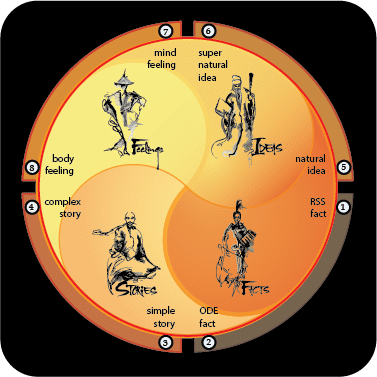Is it worth verbally to challenge the beliefs a person with Asperger’s? I’ve tirelessly tried. Are there opinions set in stone?
Like all things in human nature, arriving at a true and useful answer to this question begins with knowing the nature of people with majority personalities. In this case, I’m referring to the process whereby most children develop language. Specifically, how it occurs in an increasingly complex way. For example, at first, to most children, the word “dog” refers to a specific animal, usually the family dog. Then over time, these children generalize this word to other members of the species Canis lupus familiaris.
Few people realize that in doing this, children achieve what is actually a rather remarkable thing. Over time, the word dog more and more refers to a recognizable fractal pattern. Here, this word begins to refer to the appearances and behaviors of a group of animals which share common observable traits. Big dogs. Little dogs. Long-haired dogs. Short-haired dogs. Brown dogs. Black dogs. And so on.
This is how the brain learns, by grouping things in clusters of fractal patterns. Candle flames, and cumulus clouds, and apples and cats and dogs and frogs. Learning word meanings requires children to continue to do this. And up to this point in the process, most children more or less follow the same developmental pattern.
However, in children who begin to develop the minority personality referred to as Asperger’s, this development stops here. Whereas, in children with majority personalities, this development keeps expanding. So to kids in the majority group, the word sound “dog” can take on many meanings, some of which will fall far outside of, and are only loosely associated to, this animal group.
This never occurs in the kids with Asperger’s.
For example, children with majority personalities can come to refer to an oversexed teen-aged boy who is always chasing girls as a “dog.” People with Asperger’s have trouble understanding how this meaning applies. So while they can, and often do, learn to imitate the behaviors of majority personality kids, in truth, their doing this doesn’t make sense to them.
This is why, when they do this (and they do this all the time), these behaviors appear stilted and inauthentic. For them, doing this IS inauthentic; they are imitating a societal norm but have no idea why. Indeed, feeling pressured to imitate these “norms” without ever being taught why is the main difference between all majority and minority personalities. And the more people with Asperger’s feel pressured to imitate these norms, the more odd they become.
Now to answer your question, consider how all successful arguments rely on people’s words being well-defined. Most struggles during arguments occur when people’s definitions unknowingly do not agree. In people with Asperger’s, these disagreements happen constantly. Why? Because to them, word definitions are specific, and only the meanings they first learned apply.
Dogs are animals. Boys are boys. And boys who act like animals are still boys.
Finally, here’s an example which occurred some years ago in my practice. I was seeing a thirty-something year old man with Asperger’s and his fifty-something year old mother. They lived together and in this session, the mother was complaining that her son would not clean his room. Can you imagine? At thirty-something years old?
The thing is, the problem had nothing to do with him being lazy, non-compliant, or immature. And I knew this, so I began by telling them that the problem was that they used words differently. I told them she spoke “fuzzy” and he spoke “fussy.” Here, fuzzy refers to the way this mother’s word meanings changed depending on the context. Whereas his word meanings stayed the same regardless of the context. In other words, his word meanings were fussy; they were context independent. To him, either words had one fussy set of meanings or they had no meaning at all.
I asked the man what the phrase “clean your room” meant to him. He told me he had no clue what it meant.
I was not surprised.
I then asked this mother what she meant by this phrase. She said it meant, “make you room a little neater.” At which point, I saw the telltale sign of a light-bulb moment. His face and eyes lit up as he realized the meaning of what she’d been saying to him for years.
So to answer your question, yes, to folks with a majority personality, folks with Asperger’s can behave as if their opinions are set in stone. But it’s not their opinions but rather, the way they assign meanings to words. More important, most people, regardless of personality type, can learn to speak both ways; both fussy and fuzzy. At which point, they kind of meet in the middle, like people from different countries respectfully trying to build bridges between each other.
